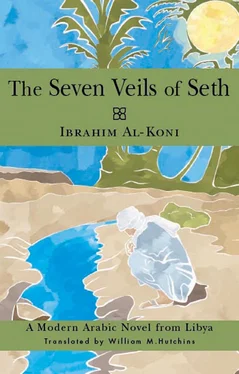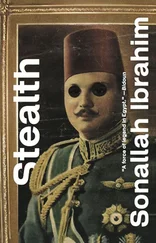She stammered, “It’s always easier for us to recite poetry than frenzy.”
“Ha, ha. . wayfaring truly is an insane frenzy, and what’s even crazier is talking about it.”
“Why should we wander when we can recite poetry?”
“Because wandering is itself a verse of poetry. Wayfaring is a substitute for poetry. When a person is incapable of reciting poetry, his only option is to pack his gear and set off to race the wind.”
“That’s depressing. I don’t know why it depresses me to hear a discussion of wandering.”
“Wayfaring is depressing because it is real, and reality is always a form of punishment.”
“But poetry is a consolation.”
He emitted a deep groan before he replied, “Poetry is wayfaring for those who are unable to wander, and wayfaring is the poetry of those unable to compose poetry.”
They entered a rough area where their sandals sank into stubborn mires. So they fell silent, but he heard her voice once they had escaped from the difficult terrain. She intoned one of the ancient songs of longing, humming it. Then she stopped. She said in a lyrical voice, as if continuing the yearning song that had ceased before it could ring out: “We are water’s daughters who seduced the desert warriors into filling our wombs with offspring to provide a posterity. Who are you?”
“I am a son of the Qibli wind, which created the desert for the relief of the wayfarer.”
“How can the desert provide relief for the wayfarer, given that it’s a desert?”
“Because relief is deliverance, and the only deliverance for the world’s wayfarers is the desert.”
“Had the water nymphs not embraced the men of the desert, they would have perished.”
“What good does it do for water’s daughters to embrace the desert’s sons, since they will perish even if they grasp the lifeline afforded by the water?”
“For them to perish beside the water is a lesser evil than for them to perish in the wasteland’s labyrinth.”
“Nonsense! To perish beside the water is a humiliation. To perish in the desert’s labyrinth is a point of pride. Perishing beside the water is a form of slackness. Perishing in the wasteland’s labyrinth is pure. Perishing beside the water is decay. To perish in the wasteland’s labyrinth is a song. To perish beside the water is disgraceful. To perish in the maze of the desert is heroic.”
“Shrewd men discuss the stranger’s wiles using the language of myths, but how futile it is for elders to assume that they will frighten off a woman with their mythological hermeneutics. Instead, they are much more likely to awaken curiosity in her breast. So, who are you really?”
“When I said I’m the son of the desert’s breath, what does that make me?”
“The desert has never exhaled anything but fire!”
“Bravo! Bravo! Fire is my name, but I’ve never disclosed it to anyone. So watch out!”
“Does the strategist fear sorcery enough to conceal his name?”
“Only fearful people like us become strategists.” “Really?”
“Dissimulation is the first secret in the law of strategic thought.”
“Tell me about your names.”
“You won’t return to your spouse’s bedchamber the same person as you came if I tell you about my names.”
“You inflame my curiosity.”
“You obviously understand what it means for water and fire to meet.”
“Water and fire?”
“The offspring of water and the offspring of fire. . ”
“You’re contributing to my insanity.”
“I have seven names. They are my veils.”
“Your veils?”
“They are more like scarves that protect me from people’s duplicity.”
“Do you have enemies?”
“Strangers only attribute cunning to a person who has enemies.”
“It would really be sweet if I could hear the rest of your names.”
“How can I tell you my other names when you haven’t even decoded the talisman protecting the first one?”
“How can the talisman for the first name be decoded?”
“The only way to decode it is through the union of fire and water.”
“But their union destroys the fire.”
“The fire that dies in their union brings new life to the water. What doesn’t perish in the wasteland is not generated in the spirit world.”
“I feel dizzy.”
She collapsed into his arms and he carried her toward the sword dunes, stumbling like a heavily laden camel.
One dark night, at the foot of a venerable mountain in the heart of an oasis lost in a desert that had no beginning or end, a suspicious specter advanced slowly. He did not take the path that circled the foot of the mountain from the northwest but slipped through the palms on the eastern side and crossed the secluded area adjacent to the debris of the mountain’s flank. Then he made his way to the burying fields that climbed the mountain’s southern haunch where the stranger had taken up residence in the vault of a mausoleum.
Before this vault the specter halted, petrified, like a boulder. He did not stir, breathe, or speak and could easily have been a scarecrow from the fields or a demon jinni who had decided to terrify the hearts of passersby.
His prayer lasted for a long time before he made a sound to announce his presence. He emitted a weird panting noise that was not a cough, hawking, guffaw, or shout. Another specter popped from the mouth of the vault, took two steps toward the visitor, and then also went rigid. He held himself erect, faced the visitor, and did not stir. He stood motionless for a long time. There reigned between them the silence of eternal deserts that are devoid of mortals, grazing beasts, and birds. As the confrontation continued, the stillness grew ever more magical, profound, and mysterious. The two evidently enjoyed the stillness. Their meeting seemed to have been ordained before the dawn of recorded time. They appeared to communicate through their silence, as if silence were their language, as if they were more eloquent when speaking with silence’s tongue than with a physical tongue. They might well have been two incognito gods rather than the progeny of terrestrial creatures enchanted by the tongue’s babbling. The offspring of the Unknown scorn the tongue and consider its chattering base defilement that cannot be effaced even by the grandest oblations.
Their silence could have lasted forever, since their silent communication was apparently quite effective, but a nearby owl hooted, rocking the desert’s stillness and reminding them that an ignoble organ called the tongue rested between both their sets of jaws. So the visitor thought he would visit that arena first: “Since prophecy has not descended to the low-lying world of people, people have no choice but to knock on the door of prophecy.”
The vault’s master answered him allusively: “Great is the man who lauds prophecy to the people. Great, great is the man who does not wait for prophecy to knock on his door but goes to knock on prophecy’s portal, even when this forces him to compromise a nobleman’s gravity and to slink by night to the burying grounds.”
The visitor released a moan of longing. “To be guided to one with whom communications have been ruptured for years and years is also a prophecy.”
The vault’s master approached his guest, took his hand, and guided him to a seat on a mat by the tomb’s entrance. Then he sat down beside him. Once more the two specters confronted each other, but then the host substituted for the tongue of the jinn that of human beings: “It’s hardly conceivable that a veil could conceal what time once disclosed.” “You’re right. When the days have stripped a heart naked, not even a thousand veils can hide it.”
Читать дальше












